初中英语语法知识—情态动词的分类汇编
初中英语语法知识—情态动词的全集汇编(3)
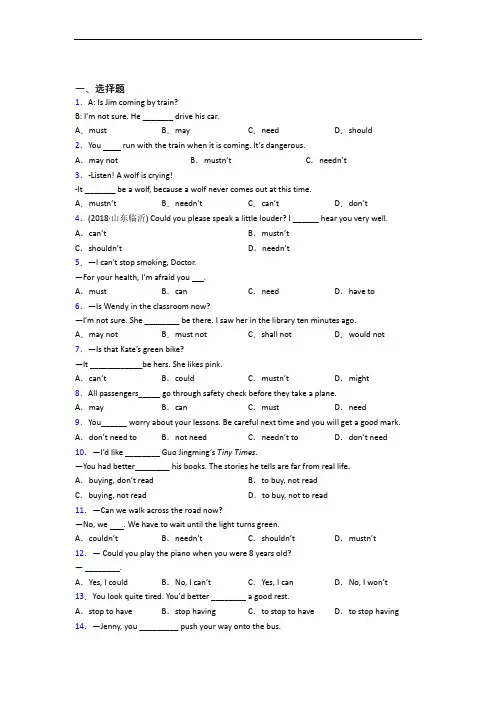
一、选择题1.A: Is Jim coming by train?B: I’m not sure. He _______ drive his car.A.must B.may C.need D.should 2.You run with the train when it is coming. It’s dangerous.A.may not B.mustn’t C.needn’t3.-Listen! A wolf is crying!-It _______ be a wolf, because a wolf never comes out at this time.A.mustn’t B.needn’t C.can’t D.don’t 4.(2018·山东临沂) Could you please speak a little louder? I ______ hear you very well. A.can’t B.mustn’tC.shouldn’t D.needn’t5.―I can't stop smoking, Doctor.―For your h ealth, I'm afraid you .A.must B.can C.need D.have to 6.—Is Wendy in the classroom now?—I’m not sure. She ________ be there. I saw her in the library ten minutes ago.A.may not B.must not C.shall not D.would not 7.—Is that Kate’s green bike?—It ____________be hers. She likes pink.A.can’t B.could C.mustn’t D.might8.All passengers_____ go through safety check before they take a plane.A.may B.can C.must D.need 9.You______ worry about your lessons. Be careful next time and you will get a good mark. A.don’t need to B.not need C.needn’t to D.don’t need 10.—I’d like ________ Guo Jingming’s Tiny Times.—You had better________ his books. The stories he tells are far from real life. A.buying, don’t read B.to buy, not readC.buying, not read D.to buy, not to read11.—Can we walk across the road now?—No, we . We have to wait until the light turns green.A.couldn’t B.needn’t C.shouldn’t D.mustn’t 12.— Could you play the piano when you were 8 years old?— ________.A.Yes, I could B.No, I can’t C.Yes, I can D.No, I won’t 13.You look quite tired. You'd better ________ a good rest.A.stop to have B.stop having C.to stop to have D.to stop having 14.—Jenny, you _________ push your way onto the bus.—I’m really sorry about it.A.mustn’t B.needn’t C.may not15.—Can I take some milk and biscuits to the reading room?—No, our school has a rule that students _______ eat or drink there.A.can’t B.mustn’t C.needn’t D.may not16.(江苏省无锡市锡北片2017届九年级下学期期中考试)—Where are you going for your summer holiday?—We go to Yun Nan, but we haven’t decided yet.A.should B.will C.may D.must17.— I would like________ to see a movie.—It’s too late. You’d better ________alone.A.to go, go B.go, not go C.to go, not go D.going, go 18.—Must I start now?—No, you_______________.A.mustn't B.can't C.needn't D.must19.—I feel tired.—You ________ go to bed so late.A.must B.shouldn’t C.should20.This book _____ Lucy’s. Look! Her name is on the book cover.A.must be B.may be C.can’t be D.mustn’t be 21.Everyone______ be polite to their parents.A.could B.may C.should D.can22.—________your house be cleaned right now?—No,it needn't.It may be cleaned this afternoon.()A.Must B.May C.Can【参考答案】***试卷处理标记,请不要删除一、选择题1.B解析:B【解析】【详解】句意:——吉姆坐火车来吗?——我不确定,他可能开自己的车。
八年级情态动词的知识点
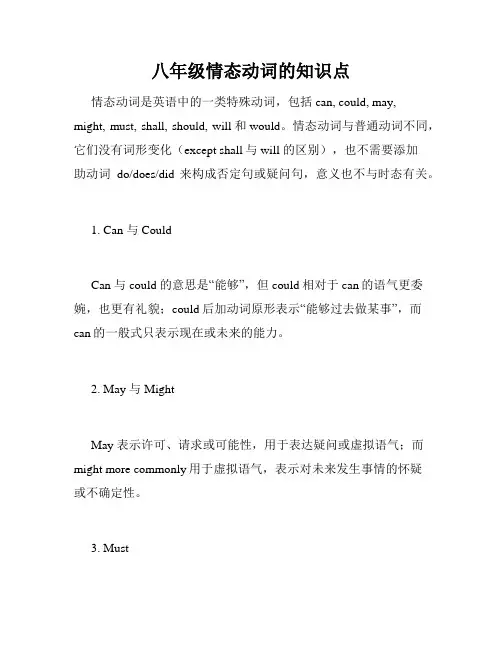
八年级情态动词的知识点情态动词是英语中的一类特殊动词,包括can, could, may, might, must, shall, should, will和would。
情态动词与普通动词不同,它们没有词形变化(except shall与will 的区别),也不需要添加助动词do/does/did来构成否定句或疑问句,意义也不与时态有关。
1. Can 与 CouldCan 与could 的意思是“能够”,但could相对于can的语气更委婉,也更有礼貌;could后加动词原形表示“能够过去做某事”,而can的一般式只表示现在或未来的能力。
2. May 与 MightMay 表示许可、请求或可能性,用于表达疑问或虚拟语气;而might more commonly用于虚拟语气,表示对未来发生事情的怀疑或不确定性。
3. MustMust强调必须、不可避免,表示绝对肯定或高度推断;用于表达命令或建议,以及对情况的强烈表示。
4. Shall 与 ShouldShall 和should用于表达命令、请求或建议,但shall主要用于将来时,而should则是一种情态动词,强调道义义务和道义要求,较具有礼貌和客观性。
5. Will 与 WouldWill 表示将要发生的事情,也表示愿望或决心;Would则常用于虚拟语气和条件句,表示假设、愿望或敬语。
6. Can与May的用法差异Can 表示某人能够做某事,能力在第一位。
而may则强调许可、允许的意义,是语气委婉的表达方式。
7. Should与Would的用法差异Should是一种道义上的情态动词,引申出一定的礼貌和可能性;而would则更多地表示愿望和推测,即假设的语气。
8. Must 和Have to两者不同点:must是限定词,have to 则比较口语化,常用于口语中;must表示主观推断,而have to则表示客观事实。
9. 动词原型与情态动词连用情态动词和动词原形连用是比较常见的用法。
初中情态动词知识点归纳
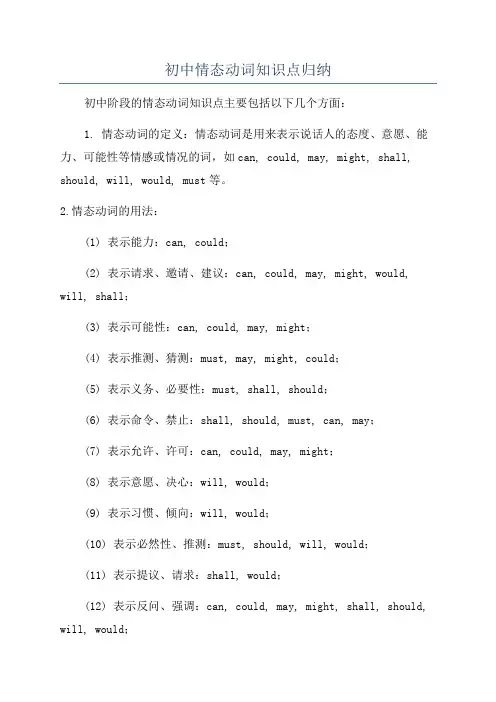
初中情态动词知识点归纳初中阶段的情态动词知识点主要包括以下几个方面:1. 情态动词的定义:情态动词是用来表示说话人的态度、意愿、能力、可能性等情感或情况的词,如can, could, may, might, shall, should, will, would, must等。
2.情态动词的用法:(1) 表示能力:can, could;(2) 表示请求、邀请、建议:can, could, may, might, would, will, shall;(3) 表示可能性:can, could, may, might;(4) 表示推测、猜测:must, may, might, could;(5) 表示义务、必要性:must, shall, should;(6) 表示命令、禁止:shall, should, must, can, may;(7) 表示允许、许可:can, could, may, might;(8) 表示意愿、决心:will, would;(9) 表示习惯、倾向:will, would;(10) 表示必然性、推测:must, should, will, would;(11) 表示提议、请求:shall, would;(12) 表示反问、强调:can, could, may, might, shall, should, will, would;(13) 表示承诺、保证:will, would;(14) 表示否定:can't, couldn't, may not, mustn't, shouldn't, won't, wouldn't。
3.情态动词的句型:(1) 能力句型:主语 + can/could + 动词原形;(2) 请求句型:主语 + can/could/may + 动词原形 + 其他;(3) 建议句型:主语 + should + 动词原形;(4) 命令句型:主语 + must/should + 动词原形 + 其他;(5) 允许句型:主语 + can/could/may + 动词原形 + 其他;(6) 必要性句型:主语 + must/should + 动词原形;(7) 意愿句型:主语 + will/would + 动词原形;(8) 可能性句型:主语 + can/could/may/might + 动词原形;(9) 推测句型:主语 + must/may/might + 动词原形;(10) 禁止句型:主语 + mustn't/shouldn't + 动词原形。
情态动词主要用法总结
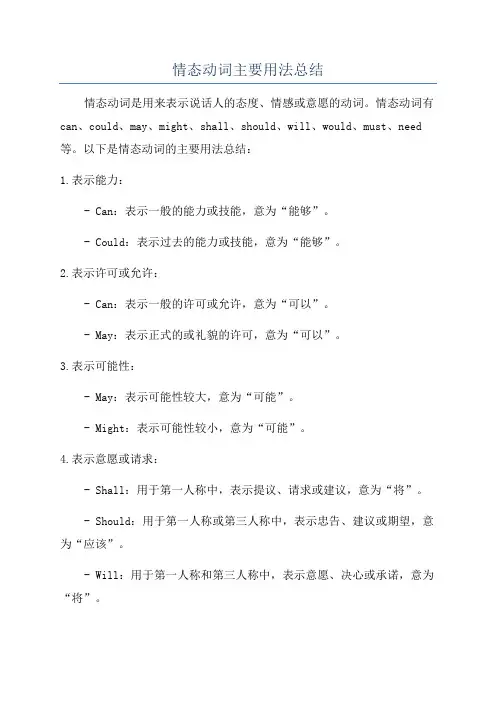
情态动词主要用法总结情态动词是用来表示说话人的态度、情感或意愿的动词。
情态动词有can、could、may、might、shall、should、will、would、must、need 等。
以下是情态动词的主要用法总结:1.表示能力:- Can:表示一般的能力或技能,意为“能够”。
- Could:表示过去的能力或技能,意为“能够”。
2.表示许可或允许:- Can:表示一般的许可或允许,意为“可以”。
- May:表示正式的或礼貌的许可,意为“可以”。
3.表示可能性:- May:表示可能性较大,意为“可能”。
- Might:表示可能性较小,意为“可能”。
4.表示意愿或请求:- Shall:用于第一人称中,表示提议、请求或建议,意为“将”。
- Should:用于第一人称或第三人称中,表示忠告、建议或期望,意为“应该”。
- Will:用于第一人称和第三人称中,表示意愿、决心或承诺,意为“将”。
- Would:用于第一人称和第三人称中,表示客气的请求、建议或愿望,意为“将”。
5.表示必要性或推测:- Must:表示必须性或应该性,意为“必须”。
- Should:表示推测、猜测或可能性较大的必要性,意为“应该”。
6.表示时间或条件:- Will/Would:表示未来时间或条件,意为“将/将会”。
7.表示推测或假设:- Must:表示肯定的推测,意为“一定”。
- May/Might:表示可能的推测,意为“可能”。
需要注意的是,情态动词本身没有人称和数的变化,后面的动词应为原形。
另外,他们常常与动词的原形连用构成谓语,可以用于各种句型,例如肯定句、否定句、疑问句等。
情态动词归类大全
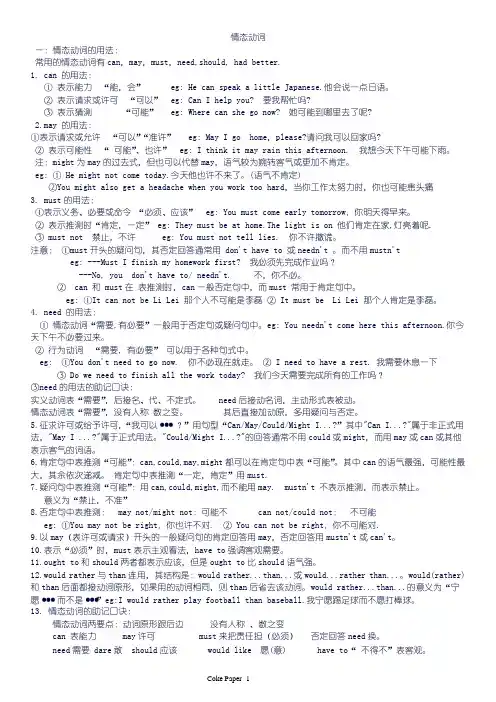
情态动词一:情态动词的用法:常用的情态动词有can,may,must,need,should, had better.1. can 的用法:①表示能力“能,会” eg: He can speak a little Japanese.他会说一点日语。
②表示请求或许可“可以” eg: Can I help you? 要我帮忙吗?③表示猜测“可能” eg: Where can she go now? 她可能到哪里去了呢?2.may 的用法:①表示请求或允许“可以”“准许” eg: May I go home,please?请问我可以回家吗?②表示可能性“可能”、也许” eg: I think it may rain this afternoon. 我想今天下午可能下雨。
注:might为may的过去式,但也可以代替may,语气较为婉转客气或更加不肯定。
eg: ① He might not come today.今天他也许不来了。
(语气不肯定)②You might also get a headache when you work too hard,当你工作太努力时,你也可能患头痛3. must的用法:①表示义务、必要或命令“必须、应该” eg: You must come early tomorrow.你明天得早来。
②表示推测时“肯定,一定” eg: They must be at home.The light is on 他们肯定在家,灯亮着呢.③ must not 禁止,不许 eg: You must not tell lies. 你不许撒谎。
注意:①must开头的疑问句,其否定回答通常用 don't have to 或needn't 。
而不用mustn'teg: ---Must I finish my homework first? 我必须先完成作业吗?---No, you don't have to/ needn't. 不,你不必。
七年级英语下册《情态动词要点》
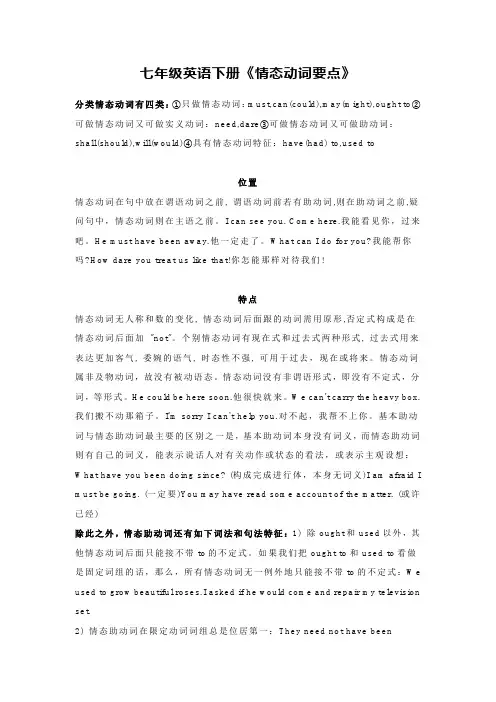
七年级英语下册《情态动词要点》分类情态动词有四类:①只做情态动词:must,can(could),may(might),ought to②可做情态动词又可做实义动词:need,dare③可做情态动词又可做助动词:shall(should),will(would)④具有情态动词特征:have(had) to,used to位置情态动词在句中放在谓语动词之前, 谓语动词前若有助动词,则在助动词之前,疑问句中,情态动词则在主语之前。
I can see you. Come here.我能看见你,过来吧。
He must have been away.他一定走了。
What can I do for you?我能帮你吗?How dare you treat us like that!你怎能那样对待我们!特点情态动词无人称和数的变化, 情态动词后面跟的动词需用原形,否定式构成是在情态动词后面加"not"。
个别情态动词有现在式和过去式两种形式, 过去式用来表达更加客气, 委婉的语气, 时态性不强, 可用于过去,现在或将来。
情态动词属非及物动词,故没有被动语态。
情态动词没有非谓语形式,即没有不定式,分词,等形式。
He could be here soon.他很快就来。
We can't carry the heavy box.我们搬不动那箱子。
I'm sorry I can't help you.对不起,我帮不上你。
基本助动词与情态助动词最主要的区别之一是,基本助动词本身没有词义,而情态助动词则有自己的词义,能表示说话人对有关动作或状态的看法,或表示主观设想:What have you been doing since? (构成完成进行体,本身无词义)I am afraid I must be going. (一定要)You may have read some account of the matter. (或许已经)除此之外,情态助动词还有如下词法和句法特征:1) 除ought和used以外,其他情态动词后面只能接不带to的不定式。
(完整版)初中情态动词用法总结
一情态动词的用法和辨析,情态动词表示推测和可能,由情态动词引导的一般疑问句的回答。
二 1 只是情态动词: can, could, may, might, must2 可做情态动词,可做实义动词: need, dare3 可做情态动词,可做助动词: will, would, shall, should4 特殊: have to, ought to, used to三 1 有一定的词义,但不能单独作谓语,必须与行为动词和系动词连用构成谓语。
2 无人称和数的变化。
( have to 除外)Eg: He has to stay here.3 后接动词原形。
4 具有助动词作用,可构成否定,疑问或简短回答。
四① 表示能力,“能,会”。
Eg : Can you play basketball?② 表示怀疑,猜测,常用于否定句或疑问句。
Eg :Li hua can’t be in the classroom.③ 表示请求,允许,多用于口语,译“可以”= may.Eg: youcangonow.④can 开头的疑问句,肯定句,否定句用 can 或 can’t.①can 的过去式,表示过去的能力。
Eg :I could swim when I was seven years old.②could 开头的疑问句,肯定和否定回答用 could, couldn’ t 如果 could 表示现在的委婉,用 can 回答。
Eg: Could I have a drink? Yes, you can.① 表示推测,“可能,也许”,用于肯定句。
Eg: He may come tomorrow.② 表示请求,“许可,可以”。
Eg: May I borrow your book?注:表示请求,许可时,主语为第一人称的一般疑问句,否定回答用 mustn’t“不可以,禁止,不许”,不用may not“可能不”。
③表示祝愿。
Eg :May you success.①表示“可以”,用于过去时中。
中考英语情态动词考点总结与归纳
中考英语情态动词考点 - 总结与归纳一、情态动词的定义情态动词是指一类常用于英语中表示某种程度或表达说话者态度的动词。
这类动词一般与其他动词连用,构成一种新的动词形式。
情态动词在语言学中属于一种独立的语法类别,通常不能被变位或时态等语法标记所改变。
常见的情态动词有 can, could, may, might, must, shall, should, will, would, ought to 等等。
二、情态动词的用法1.表示能力或可能性Can 表示一种能力或可能性,通常表示能力和肯定的意思,例如:-I can swim. (我会游泳。
)-He can speak Chinese. (他会说中文。
)Could 和 can 的用法基本相同,但 could 表示能力或可能性的含义较弱,或用于委婉地表达请求或建议,例如:-I could come to your party if I have time. (如果有时间的话,我可以来参加你的派对。
)-Could you please pass me the salt? (请你把盐递给我好吗?)May 和 might 表示可能性,通常表示可能但不一定发生的情况,例如:-It may rain tomorrow. (明天可能下雨。
)-The train might be late. (火车可能会晚点。
)2.表示推测或假设May, Might 和 could 也可以用于表示推测或假设,例如:-She might be at home. (她可能在家。
)-I may have left my keys at work. (我可能在办公室把钥匙忘了。
)-Could you be more specific about what you want? (你能不能更具体地说一下你想要的是什么?)3.表示劝告或命令Should 和 ought to 可以用于表示劝告或命令,后者更强调应该做的事情,例如:-You should take the medicine three times a day. (你应该每天服药三次。
八年级情态动词知识点归纳
八年级情态动词知识点归纳情态动词是英语语法中的重要部分,它们在句子中起着很关键的作用。
在英语八年级学习过程中,学生们需要掌握情态动词的用法和特点,以便正确地运用它们。
本文将从三个方面总结八年级情态动词知识点,分别是情态动词的定义和分类、情态动词的用法、情态动词的否定和疑问句。
一、情态动词的定义和分类情态动词是指表示说话人态度或者看法的动词,它们的基本意义是表示一种能力、可能性、必要性、允许性、义务性、愿望等。
常见的情态动词有can、could、may、might、shall、should、will、would、must等。
根据情态动词的用法和意义,可以将其分为五类:1. 表示能力或可能性的情态动词:can、could、may、might。
例如:I can speak English fluently. 我能流利地说英语。
2. 表示建议或命令的情态动词:shall、should。
例如:You should go to bed early. 你应该早点睡觉。
3. 表示必要性或义务的情态动词:must、have to。
例如:You must finish your homework. 你必须完成你的作业。
4. 表示意愿或决心的情态动词:will、would。
例如:I will help you with your English. 我会帮你做英语。
5. 表示推测和猜测的情态动词:may、might、could。
例如:He may be late for the meeting. 他也许会迟到会议。
二、情态动词的用法情态动词的用法有以下几点:1. 情态动词后面要接动词原形。
例如:I can swim. 我会游泳。
2. 情态动词没有人称和数的变化。
例如:You can ride a bike. 你会骑自行车。
3. 情态动词不能单独作为谓语动词,必须与其他动词一起使用。
例如:She should study harder. 她应该更努力地学习。
中考英语情态动词总结
中考英语情态动词总结情态动词是一类特殊的动词,表达了说话人的态度、意愿、能力、推测等情态。
常见的情态动词有can, could, may, might, must, shall, should, will, would, ought to等。
下面是关于这些情态动词的总结:1. can: 表示能力、许可。
常用于肯定句和疑问句中,一般不能用于否定句。
例如:"I can swim."(我会游泳。
)"Can you help me?"(你能帮我吗?)2. could: 表示过去的能力、许可,也可以用于请求或建议。
例如:"When I was young, I could run very fast."(我小时候跑得很快。
)"Could you please pass me the salt?"(你能帮我递一下盐吗?)4. might: 表示较小的可能性,常用于虚拟语气句中。
例如:"If it doesn't rain, we might go for a picnic."(如果不下雨,我们可能去野餐。
)5. must: 表示必须、推测的肯定。
例如:"You must finish your homework before you go out."(你必须在出去之前完成作业。
)"It's already 9 o'clock. He must be at home."(已经9点了,他一定在家。
)6. shall: 表示将来的意愿,用于第一人称(I, we)的疑问句中。
例如:"Shall we go to the park tomorrow?"(明天我们去公园吧?)7. should: 表示应该,常用于建议、请求中。
例如:"You should take a break."(你应该休息一下。
- 1、下载文档前请自行甄别文档内容的完整性,平台不提供额外的编辑、内容补充、找答案等附加服务。
- 2、"仅部分预览"的文档,不可在线预览部分如存在完整性等问题,可反馈申请退款(可完整预览的文档不适用该条件!)。
- 3、如文档侵犯您的权益,请联系客服反馈,我们会尽快为您处理(人工客服工作时间:9:00-18:30)。
一、选择题1.—Look! Mrs. Smith is standing in front of the teaching building.—It______ her. She has gone to Egypt for her holiday.A.must be B.mustn’t be C.can be D.can’t be 2.—I’d like ________ Guo Jingming’s Tiny Times.—You had better________ his books. The stories he tells are far from real life.A.buying, don’t read B.to buy, not readC.buying, not read D.to buy, not to read3.You have finished most of the work, so you ____ start working so early tomorrow. You may come at 9 :00.A.can't B.mustn't C.needn't D.couldn't 4.Since you are very tired, you ______ finish the work today.A.needn’t B.may not C.mustn’t D.can’t5.All passengers_____ go through safety check before they take a plane.A.may B.can C.must D.need6.A: Is Jim coming by train?B: I’m not sure. He _______ drive his car.A.must B.may C.need D.should 7.From March 23rd, 2013, anyone under the age of 14 ________ go into Disneyland alone. A.couldn’t B.mustn’t C.needn’t D.mightn’t 8.—Can I take some milk and biscuits to the reading room?—No, our school has a rule that students _______ eat or drink there.A.can’t B.mustn’t C.needn’t D.may not 9.— Mom, I got a big box from express(快递). What is it?—I’m not sure. It ________be a present from your grandmother.A.should B.might C.must D.will 10.—Have you heard about the temperature of the earth will rise to 59℃ in 2020?—Don’t worry! The news _______ be true.A.must not B.may not C.needn’t D.will not 11.He like coffee. I see him drink a cup at times.A.must B.may C.can’t D.mustn’t 12.Even the top student can't work out this problem, so it________ be too difficult. A.must B.may C.can D.need 13.—Jack must be in his office, I think.—No, he be in the office. He flew to Canada this morning.A.needn't B.shouldn't C.can't D.mustn't 14.It’s raining all day, so I ________ stay at home.A.can’t B.has to C.have to15.The flowers ________ every day, or they will die.A.must water B.can be wateredC.should water D.must be watered16.---I heard they went skating in the mountains last winter.---It ______ true because there was little snow there.A.may not be B.won’t be C.couldn’t be D.will be 17.—The food ________be delicious . You ate it up .—You bet . My mum cooked it for me .A.must B.may C.can D.need18.一Hurry up, Mark! Let's cross the road as quickly as possible.一No,you . Don't you see the light is still red?A.couldn't B.wouldn't C.mustn't D.needn't19.— May I watch TV for a while?— No, you __________. You have to finish your homework first.A.can’t B.needn’t C.mustn’t D.won’t20.My head teacher has made a set of rules to show what we students ________ and ________ not do in class.A.must; must B.will; willC.need; need D.might; might21.—I often see Maria in the library, and she _________ like reading best.—That’s right.A.need B.may C.must D.can22.You __ drive your car so fast. It's very dangerous.A.wouldn't B.shouldn't C.couldn't D.mightn't【参考答案】***试卷处理标记,请不要删除一、选择题1.D解析:D【解析】【分析】【详解】句意:——看!史密斯太太正站在教学楼的前面。
——不可能是他。
她去埃及度假了。
考查情态动词表示推测。
must be一定是;mustn’t be禁止是;can be可能是;can’t be不可能是。
根据She has gone to Egypt for her holiday.可知她去了埃及,不可能站在教学楼前,故选D。
2.B解析:B【解析】【详解】句意:——我想买郭敬明的《小时代》。
——你最好不要读他的书。
他讲的故事与现实生活相去甚远。
考查非谓语动词及固定句型。
短语would like to do sth.愿意去做某事;第一空排除AC;You had better+动词原形,你最好做某事;You had better not+动词原形,你最好不要做某事。
第二空排除D。
根据题意,故选B。
3.C解析:C【解析】【详解】句意:你已经完成了大部分工作,所以你明天不必这么早就开始工作。
你可以9点来。
本题考查情态动词。
can't不可能,mustn’t禁止,needn’t不必,couldn’t可能不。
根据You have finished most of the work可知,你已经完成了大部分工作,因此明天不必这么早就开始工作,因此用needn’t,故选C。
4.A解析:A【解析】【详解】句意:既然你很累,今天就不必完成这项工作了。
A. needn’t不必;B. may not 可能不;C. mustn’t禁止;D. can’t不能。
根据上文Since you are very tired,可知,情态动词needn’t表示不需要,后面直接加动词原形。
根据题意,故选A。
5.C解析:C【解析】【详解】句意:所有乘客在乘坐飞机前必须经过安全检查。
考查情态动词辨析。
may可以,表许可或请求;can能,表能力或许可;must必须,指一定;need需要,指有必要。
根据句意语境可知,安检强调“必须,一定”,故选C。
6.B解析:B【解析】【详解】句意:——吉姆坐火车来吗?——我不确定,他可能开自己的车。
考查情态动词辨析。
A项,必须,一定,表示肯定推测;B项,也许,表示有可能;C项,需要;D项,应该。
根据回答部分I’m not sure.可知,此处并不确定吉姆是开车来还是乘坐火车来,所以此处是“可能”。
故选B。
【点睛】must意为“必须,应该”,可以表示主观上一定要做什么或者肯定推测。
例如:I must go home to look after my mum. This pair of shoes must be hers. may意为“可以,也许”,可以表示请求或者推测(无法断定)。
例如:May I come in? It may be hers,but I’m not sure. need意为“需要”,既是情态动词也是行为动词。
例如:You needn’t finish your homework right now. You need to tell him the truth. should意为“应该”,表示责任或者义务。
例如:You should finish practising playing the piano at first.7.B解析:B【解析】【详解】句意:从2013年3月23日开始,14岁以下的人禁止单独去迪士尼乐园。
考查情态动词词义辨析。
couldn’t不能;mustn’t禁止,不允许;needn’t不必;mightn’t可能不。
